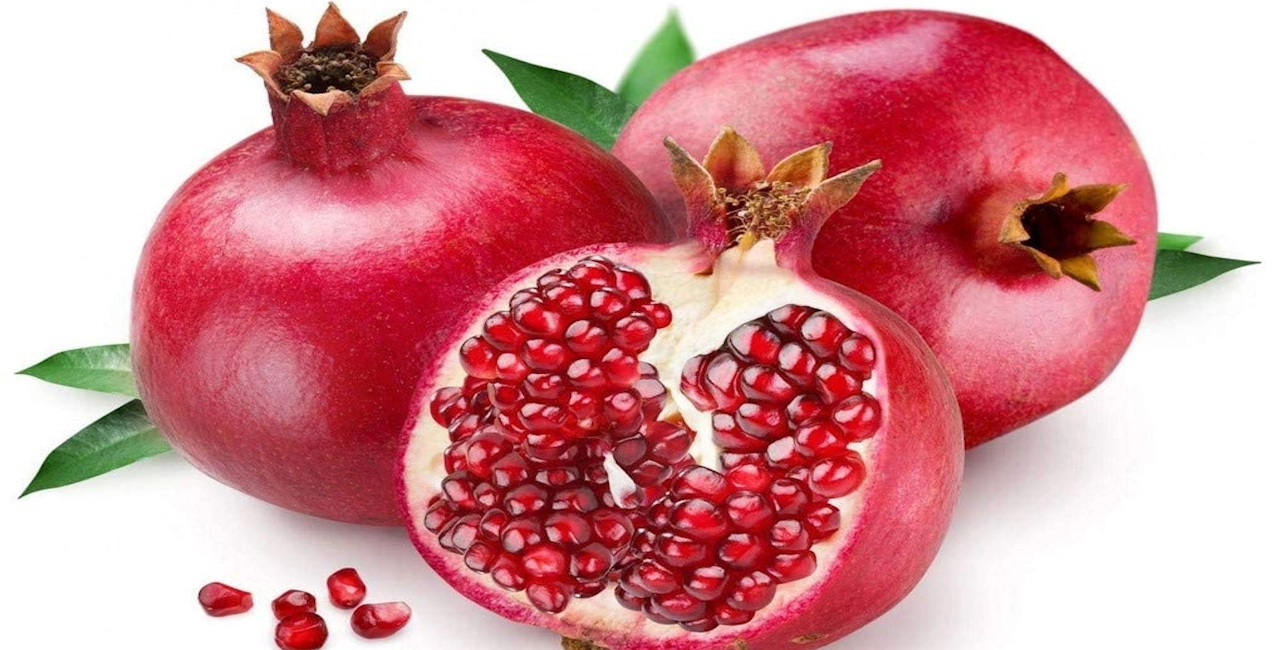Currently Empty: ₹0.00

Pomegranate, scientifically known as Punica granatum, is a fruit that has been cherished for centuries across various cultures and civilizations. Often referred to as the “jewel of fruits” due to its ruby-red arils, pomegranate is renowned for its sweet-tart flavor, nutritional benefits, and symbolic significance. This fruit, native to the Middle East and South Asia, has become a staple in diets worldwide, offering a refreshing taste along with a wealth of health advantages.
Historical and Cultural Significance
Pomegranate has a rich history that dates back thousands of years. Ancient Egyptians regarded it as a symbol of prosperity and fertility, often including it in burial ceremonies. In Greek mythology, the fruit is associated with Persephone and the changing seasons. In Hindu culture, pomegranate represents health and abundance, often used in rituals and traditional medicine.
Throughout history, pomegranate has been a symbol of life, death, and rebirth. It appears in religious texts, including the Bible and the Quran, highlighting its sacred and healing properties. This deep cultural reverence for pomegranate extends to modern times, where it continues to be a cherished fruit across the globe.
Botanical Description
Pomegranate trees are small, deciduous shrubs or trees that grow up to 5-8 meters in height. They thrive in warm, dry climates and are cultivated extensively in countries like India, Iran, Spain, and the United States. The fruit itself is round with a thick, leathery rind that encases hundreds of juicy, edible arils. Each aril contains a seed surrounded by a sac of sweet-tart juice.
The outer skin can range from yellowish-red to deep crimson, while the arils glisten like precious rubies when the fruit is opened. Pomegranate trees are hardy and can withstand drought conditions, making them a resilient and valuable crop.
Nutritional Value and Health Benefits
Pomegranate is a powerhouse of essential nutrients and antioxidants. It is rich in vitamins C and K, folate, and potassium, making it a valuable addition to a balanced diet. The fruit is also known for its high levels of polyphenols, which contribute to its antioxidant properties.
- Heart Health: Pomegranate juice is believed to reduce blood pressure, lower cholesterol levels, and improve overall heart health. The antioxidants in pomegranate help prevent the oxidation of LDL (bad) cholesterol, reducing the risk of atherosclerosis.
- Anti-Inflammatory Properties: The fruit contains anti-inflammatory compounds that may alleviate symptoms of chronic conditions such as arthritis and inflammatory bowel disease.
- Cancer Prevention: Research suggests that pomegranate may inhibit the growth of certain cancer cells, including breast and prostate cancer, due to its potent antioxidants and anti-inflammatory effects.
- Digestive Health: Pomegranate is a rich source of dietary fiber, which promotes healthy digestion and aids in relieving constipation.
- Skin and Hair Benefits: The vitamins and antioxidants in pomegranate can enhance skin elasticity, promote collagen production, and support healthy hair growth.
- Immune Boosting: With its high vitamin C content, pomegranate helps strengthen the immune system and protects against infections.
Culinary Uses of Pomegranate
Pomegranate’s versatility makes it a favorite in kitchens worldwide. Its sweet-tart arils can be eaten fresh, added to salads, or used as garnishes. Pomegranate juice is a refreshing beverage that also serves as a base for cocktails and mocktails. In Middle Eastern cuisine, pomegranate molasses is a popular ingredient used to add a tangy-sweet depth to savory dishes.
In India, pomegranate seeds, known as “anar dana,” are dried and used as a spice to impart a tangy flavor to curries and chutneys. The fruit’s vibrant color and unique taste make it an excellent addition to desserts, smoothies, and yogurt bowls.
Growing and Harvesting Pomegranate
Pomegranate trees are typically grown in regions with a Mediterranean climate. They require well-drained soil, ample sunlight, and minimal water once established. The fruit is usually harvested in late summer to early winter, depending on the climate.
When selecting a pomegranate, look for one that is heavy for its size with a firm, unblemished skin. Properly stored in a cool, dry place, pomegranates can last for several weeks. Once opened, the arils can be refrigerated for up to a week or frozen for longer storage.
Fun Facts About Pomegranate
- Pomegranate trees can live for over 200 years under optimal conditions.
- The name “pomegranate” comes from the Latin words pomum (apple) and granatum (seeded).
- In some cultures, pomegranate seeds are associated with good luck and are consumed during celebrations like the New Year.
Conclusion
Pomegranate is more than just a delicious fruit—it is a symbol of vitality, health, and cultural heritage. Its unique combination of flavor and nutrition makes it a valuable addition to any diet. Whether consumed fresh, as juice, or incorporated into culinary creations, pomegranate continues to captivate and nourish people around the world. With its profound historical roots and modern health benefits, the “jewel of fruits” remains a timeless treasure.


